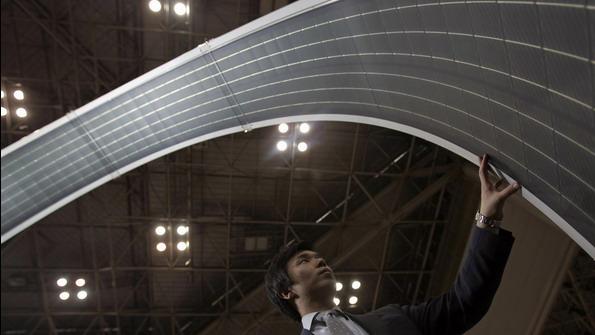
A man touches a display of the Global Solar Energy's PowerFLEX BIPV, a flexible solar module, at the fourth International Photovoltaic Power Generation (PV) Expo in Tokyo March 2, 2011. [Photo / Agencies]
BEIJING / HONG KONG - China has set its first unified benchmark grid feed-in power tariffs for solar projects, a move that will provide clearer guidance for solar project developers when making investment decisions.The rates, starting at 1 yuan (16 cents) per kilowatt hour (kWh) for projects approved after July 1, were higher than many of those proposed and accepted by State-owned solar power developers in China's second official tender last year, suggesting they would be welcome news for industry participants.
The price solar power developers sell to grid operators for projects approved before July 1 and completed by the end of this year will be 1.15 yuan/kWh, the National Development and Reform Commission (NDRC) said in a document published on Monday.
For projects that were approved before July 1 and would not be completed by year-end, the on-grid price was 1 yuan/kWh, the commission said.
But projects in Tibet will continue to receive 1.15 yuan/kWh, regardless of when they were approved or built.
Analysts said the move would be positive for solar power developers, given fast-falling development costs.
"Projects will be economical to develop with these rates, given that PV (photovoltaic) prices have fallen significantly in (recent) months and solar companies are continually looking for ways to bring down costs," said Keith Li, analyst with CIMB Research.
The NDRC set the on-grid tariff for four utility-level solar power stations in the Ningxia Hui autonomous region at 1.15 yuan/kWh in April 2010, after giving 4 yuan/kWh for output from two pilot projects in 2008.
The commission said it would adjust the tariff levels in a timely manner later in accordance with changes in investment costs and technology improvement.
For projects approved through open tender, the on-grid power prices will be those proposed and accepted by bid winners, which, however, should not exceed benchmark rates.
China is eager to speed up development of clean energy and reduce its dependence on traditional fossil fuels, especially coal.
China had 700 megawatts of solar-power-generating capacity at the end of 2010, the National Energy Administration said.
The government has set a target of building more than 5 gigawatts of new solar power plants in the five years through 2015.
Reuters




